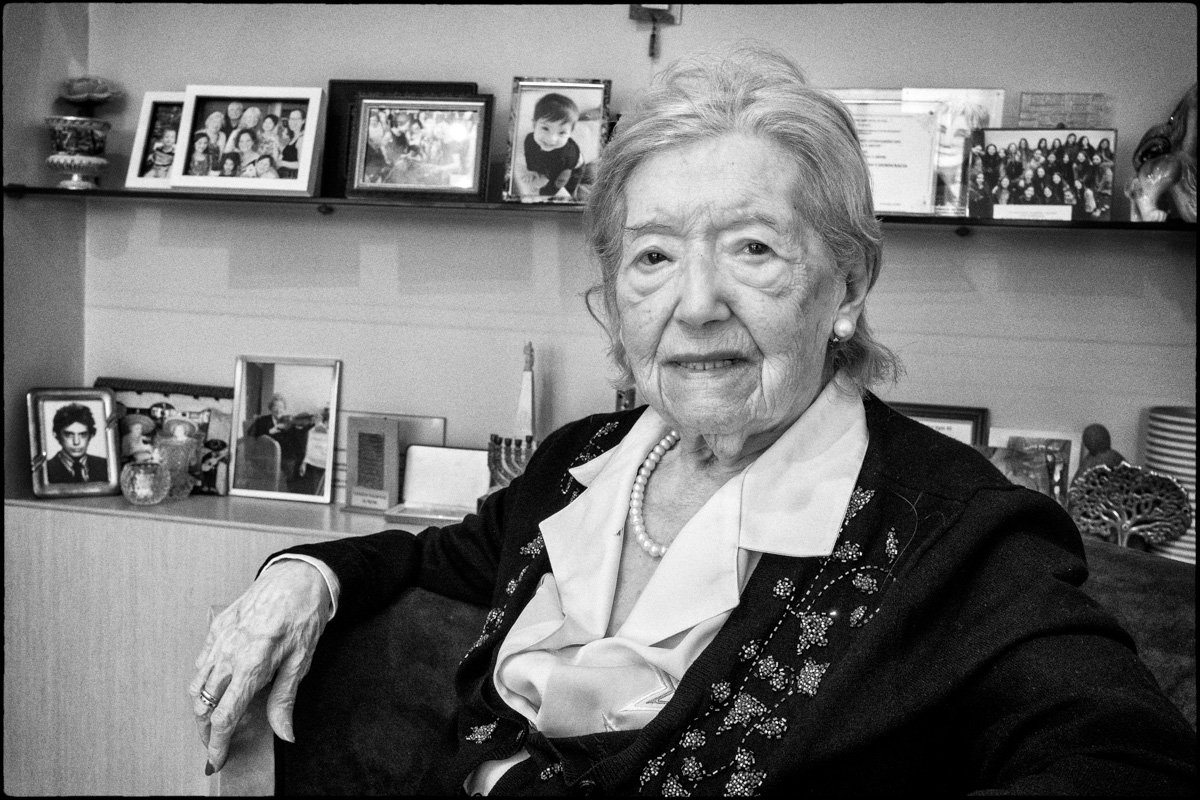Schejene Maria Laskier de Rus, known as Sara Rus, was born in 1927 in the city of Lodz, Poland. At the age of twelve she suffered the violence of Nazism and was moved with her family to the Lodz ghetto. Later she suffered subhuman living conditions in the Auschwitz concentration camp and finally she was taken to Mauthausen, where she was liberated. When the war ended, Sara and her husband Bernardo, survivors of the concentration camps, emigrated to Argentina with the illusion of starting a new life and building a family.
Sara managed to have two children, overcoming the organic difficulties resulting from a body deteriorated by her long stay in the concentration camps. Thus, on July 24, 1950, Daniel was born and five years later, Natalia.
In 1977, once again, Sara was a victim of the violence of the State Terrorism: on July 15 her son Daniel was kidnapped at the National Atomic Energy Commission, where he was developing scientific research tasks. From that moment on, Sara began her search for him, making countless national and international efforts.
Today, Sara is a member of Mothers of Plaza de Mayo - Founding Line and of the Association of Survivors of Nazi Persecution, embodying her double condition of survivor of the Nazi genocide and victim of the last civil-military dictatorship in Argentina.
Testimony:
"In Auschwitz-Birkenau the men were taken out directly. I never heard from my father again. I dared to approach an SS man with a whip in the middle of the square. People looked at me. I thought they were going to kill me. He looks at me and says, "How dare you approach me." I told him in German: "Why did you take my mother away from me? If I think today what I did... He looks at me and says, "Where do you speak German from?". I told him that German was spoken in my house. He asked me, "Which one is your mother?", and he said, "Go get her." The first save. From then on my mother was always with me. She survived the war with me. But we went through very hard times."
"In all the experiences that I tell the young people, from my life in Poland, the terrible experience of the war, to the loss of my son who disappeared in '77, what I mainly want to leave them is a message of love. I fight not to forget. I fight for Memory. So that the Nazis, those there and those here, will never have the strength they have had. Memory is the most important thing. If we don't have memory, things happen again".
_________________________
Sara Rus / Argentina 2023
Schejene María Laskier de Rus, conocida como Sara Rus, nació en 1927 en la ciudad de Lodz, Polonia. A los doce años sufrió la violencia del nazismo siendo trasladada con su familia al gueto de Lodz. Más tarde sufrió condiciones de vida infrahumana en el campo de concentración de Auschwitz y por último fue llevada a Mauthausen, lugar donde fue liberada. Cuando finalizó la guerra, Sara y su esposo Bernardo, sobrevivientes de los campos de concentración, emigran a la Argentina con la ilusión de iniciar una nueva vida y construir una familia.
Sara logró tener dos hijos, superando las dificultades orgánicas consecuencia de un cuerpo deteriorado por su prolongado paso por los campos de concentración. Fue así como el 24 de julio de 1950 nació Daniel y cinco años más tarde, Natalia.
En 1977, una vez más, Sara fue víctima de la violencia del Terrorismo de Estado: el 15 de julio su hijo Daniel fue secuestrado en la Comisión Nacional de Energía Atómica, donde desarrollaba tareas de investigación científica. A partir de ese momento, Sara inicia su búsqueda realizando innumerables gestiones a nivel nacional e internacional.
Hoy, Sara es miembro de Madres de Plaza de Mayo - Línea Fundadora y de la Asociación Sobrevivientes de la Persecución Nazi, encarnando su doble condición de sobreviviente del genocidio nazi y víctima de la última dictadura cívico-militar en Argentina.
Testimonio:
“En Auschwitz-Birkenau a los hombres directamente los sacaron. Nunca más supe de mi padre. Me atreví a acercarme a un SS con un rebenque que estaba en el medio de la plaza. La gente me miraba. Pensaba que me iban a matar. Él me mira y me dice: «Cómo te atreves a acercarte». Le dije en alemán: «¿Por qué me sacaste a mi madre?». Si hoy pienso lo que hice... Me mira y me dice: «¿De dónde hablas alemán?». Le dije que en mi casa se hablaba alemán. Me preguntó: «¿Cuál es tu madre?», y me dijo: «Anda a buscarla». La primera salvada. Desde ese entonces mi madre estuvo siempre conmigo. Sobrevivió a la guerra conmigo. Pero pasamos momentos muy duros”.
“En todas las experiencias que les cuento a los jóvenes, desde cómo fue mi vida en Polonia, la terrible vivencia de la guerra, hasta la pérdida de mi hijo desaparecido en el año 77, lo que principalmente quiero legarles es un mensaje de amor. Yo lucho por no olvidar. Lucho por la Memoria. Para que jamás los nazis, los de allá y los de aquí, tengan la fuerza que han tenido. La memoria es lo más importante. Si no tenemos memoria las cosas vuelven a pasar”.

